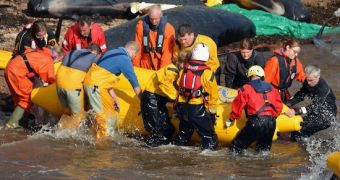This past weekend, 22 pilot whales ended up washed ashore on a beach in South Florida, apparently for no obvious reason. Some of the people who witnessed the event up-close argued that “it was like an aircraft crash.”
Whereas 17 of them died in spite of efforts to save them, 5 managed to survive and are presently being nursed back into health by the people working at Florida Atlantic University's Harbor Branch Institute for Rehabilitation.
Apparently, two other similar incidents occurred in North America (one in Cape Cod and one in Canada) throughout the same time span, so naturally concerns are now raised as to what it is exactly that caused these marine mammals to leave their natural habitats and head for the beach.
Moreover, recent news informs us that 16 pilot whales were also found beached in Scotland.
Some speculate that, because pilot whales live in groups whose members share a very strong bond between them, it may very well be that the 22 whales that beached in South Florida were in fact simply following an individual which fell ill.
As Daily Mail reports, Gareth Norman from the British Divers Marine Life Rescue explained how, “Pilot whales have a habit of beaching. One strands and the others tend to stick together.”
Presently, the pilot whales that died are being sent to various research laboratories across Florida, where marine biologists and several other specialists will deal with conducting autopsies aimed at pinning-down the underlying cause for their death.
As far as the ones still alive are concerned, sources say that the people in charge of taking care of them explain that there has been an improvement in their general wellbeing, and that they might in fact stand a chance at making a full recovery.
For those unaware, pilot whales are amongst the largest of the oceanic dolphins, and are known to be incredibly social beings.
Interestingly enough, as far as marine mammals go, this particular species is the one that in most often found stranded on various beaches, although reasonable explanations for such phenomena are still lacking.

 14 DAY TRIAL //
14 DAY TRIAL //